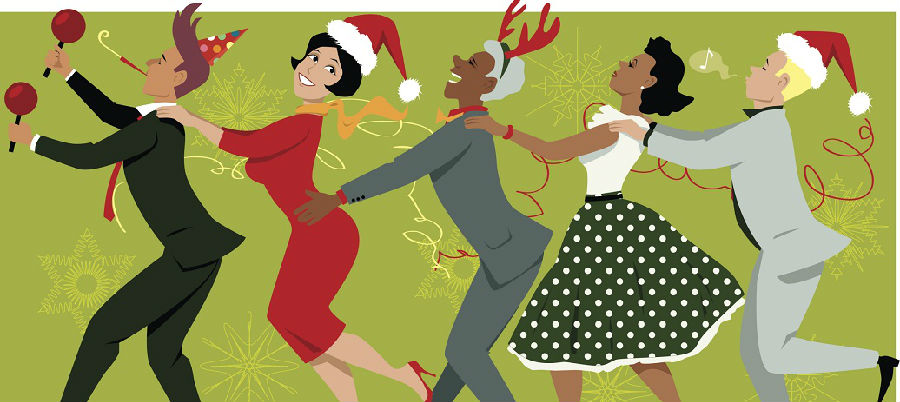巴托比職場專欄
Let them eat Christmas cake
何不食圣誕蛋糕
Don’t make seasonal festivities too formal
不要讓年會太正式
Everyone feels like winding down in December. Even if you do not celebrate Christmas, the New Year is approaching and most people take a few days’ break. In many workplaces this feeling of “mission accomplished” is accompanied by an established tradition: the office party.
每個人都想在十二月放松一下。即使你不慶祝圣誕節(jié),新年即將來臨,大多數(shù)人都會休息幾天。在許多工作場所,這種“任務完成”的感覺伴隨著一個既定的傳統(tǒng):辦公室派對。
In boom times these can be truly lavish affairs. Robbie Williams sang at Deutsche Bank’s global-equities party in 2001. A Bloomberg event in 2000, based on the seven deadly sins, was said to have cost £1m (then $1.5m). At the “Googlympus” in 2006, the internet group had tents named after different Greek gods while staff amused themselves at the “wine cork shooting gallery”.
在繁榮時期,這可能是真正的奢侈。2001年,羅比·威廉姆斯在德意志銀行的全球股票派對上演唱。2000年,彭博社根據(jù)七宗罪舉辦的一場活動據(jù)說耗資100萬英鎊(當時匯率約合150萬美元)。2006年,在Googlympus 派對上,谷歌互聯(lián)網集團用希臘諸神的名字為帳篷命名,員工們則在“葡萄酒軟木射擊館”自娛自樂。

Few companies today desire the publicity that tends to follow such events. The natural question is, if you are spending that amount on a party, how much are you charging clients? Companies are rightly more sensitive than they were about the risks involved when workers lose their inhibitions after consuming too much alcohol. A survey of American companies by the suitably named Challenger Gray & Christmas, an outplacement firm, found that 59% had discussed, or planned to discuss, the dangers of “inappropriate celebrating” with staff.
如今,很少有公司希望在此類活動上得到公眾關注。一個很自然的問題是,如果你在聚會上花了這么多錢,你會向客戶收取多少費用?當員工在飲酒過量后失去自控能力時,企業(yè)對相關風險的敏感程度理應高于以往。美國就業(yè)顧問公司 Challenger Gray & Christmas 對美國公司進行的一項調查發(fā)現(xiàn),59%的公司已經或計劃討論員工“不恰當慶祝”的危害。
To avoid these dangers, the chief operating officer of BDO, an accountancy firm, has suggested that two chaperones attend seasonal celebrations, along with first-aiders. Other accounting firms have suggested holding daytime events rather than after-hours drinks parties.
為了避免這些危險,德豪國際會計師事務所的首席運營官建議兩名陪同人員和急救人員一起參加季節(jié)性慶祝活動。其他會計師事務所建議舉行日間活動,而不是下班后進行酒會。
There is a lot to be said for daytime celebrations. First, it makes attendance easier for anyone caring for small children, or elderly relatives, and who thus finds it difficult to stay out late. Second, people are likely to be a bit more restrained in their alcohol consumption at lunchtime than in the evenings. And third, celebrating during working hours feels like a genuine break from duties; attending after work seems more like an obligation.
對于白天進行慶祝活動,有很多可圈可點的地方。首先,需要照顧老人和小孩的人更方便參加,因此他們很難在外面呆到很晚。其次,人們可能會在午餐時間比在晚上飲酒更節(jié)制。第三,在工作時間慶祝感覺像是真正地從工作中解脫出來;下班后參加似乎更像是一種義務。
Most workers don’t expect their seasonal event to turn into a Bacchanal; they are just hoping to avoid tedium. A survey of British office workers in 2014 found that only a quarter looked forward to their Christmas event and 71% would rather have a small cash bonus than a knees-up.
大多數(shù)工人并不指望他們的年會變成狂歡;他們只希望避免單調乏味。2014年對英國辦公室職員的一項調查發(fā)現(xiàn),只有25% 的人期待圣誕節(jié),71% 的人寧愿要小額現(xiàn)金獎金,也不愿狂歡聚會。
譯文由可可原創(chuàng),僅供學習交流使用,未經許可請勿轉載。












